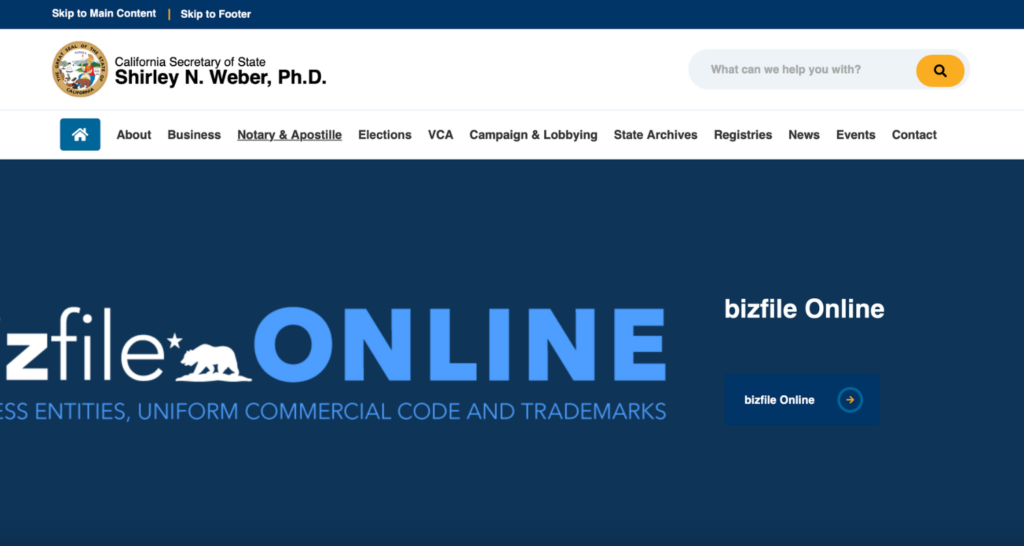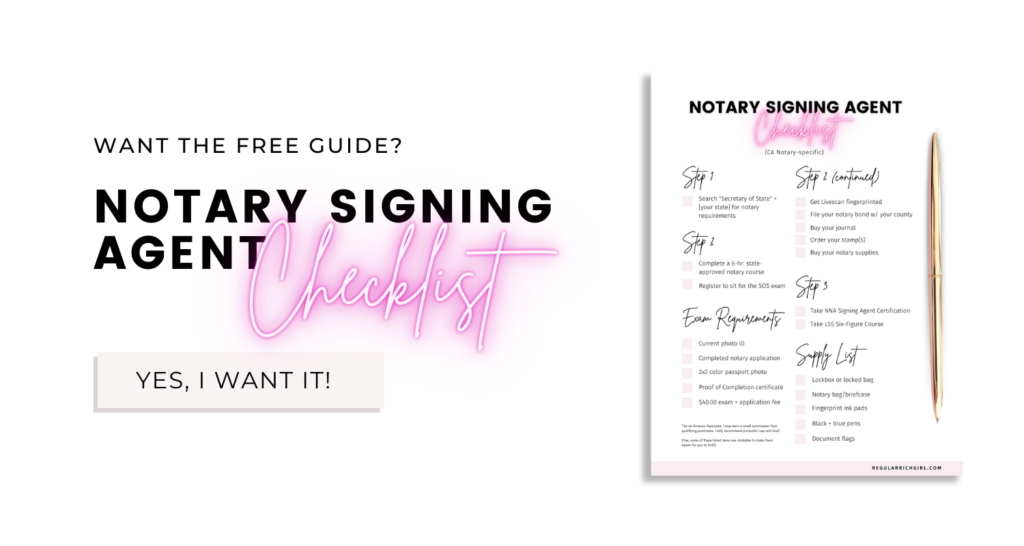I get the question–“what is a loan signing agent?” so often that I decided it was necessary to write a post that describes what a loan signing agent is, the steps to becoming one, and even a list of supplies you’ll need to perform your duties!
Are you ready? Let’s go!”

What is a loan signing agent?
A loan signing agent is the person who helps out with the final bit of closing a loan.
They make sure all the documents are signed, notarized, and sent back to the lender, which is pretty important!
They work with the borrower, lender, and escrow companies to make sure everything goes smoothly.
Being a loan signing agent is pretty sweet because you never work from the same place twice, and you can make your own schedule.
Plus, you can make some decent cash – usually around $75 to $200 per loan signing. Not too shabby, right?
If you’re looking for a flexible job in the real estate industry that pays well and involves helping people then becoming a loan signing agent might be a great choice for you.
It’s definitely worth checking out!
Loan signing agent vs. notary public
A loan signing agent is a professional who specializes in guiding borrowers through the loan signing process.
They are trained to ensure that all loan documents are properly completed and signed by the relevant parties.
Loan signing agents are typically hired by title companies, mortgage lenders, or signing services to facilitate loan signings.
On the other hand, a notary public is a public official commissioned by the state government to witness the signing of important documents and administer oaths.
A notary public’s primary responsibility is to verify the identity of the signatories and ensure that they are signing the document voluntarily and without coercion.
Notaries public are authorized to notarize a wide range of documents, including wills, powers of attorney, deeds, and contracts.
While both loan signing agents and notaries public are involved in the signing of important documents, the key difference is that loan signing agents specialize in loan signings, whereas notaries public have a broader scope of responsibility and can notarize a variety of documents.
How to become a loan signing agent
Step 1. Determine the requirements for becoming a notary public in your state.
To become a loan signing agent, you first need to become a notary public per the requirements set forth by your Secretary of State’s office.
The best place to start is by searching up “Secretary of State” + [your state], then click on the “Notary/Apostille” section of the website.
This is how the SOS website looks for the state of CA:
And you’ll see that CA’s Secretary of State has these specific requirements:
- Be 18 years of age or older (there is no maximum age set by statute)
- Be a legal California resident
- Complete a course of study approved by the Secretary of State
- Satisfactorily complete and pass a written examination prescribed by the Secretary of State
- Clear a background check
Step 2. Obtain your notary commission.
To become a notary in the state of CA you need to complete a 6-hour course (either in-person or online).
Once you pass your course and obtain proof of completion, you may register to sit for the Secretary of State exam.
**Not all states have these stringent requirements.**
Make sure you research what is required for your state.
Step 2.1. Exam Requirements:
- A current photo ID (CA Driver’s License or ID Card issued by the DMV)
- Your completed Notary Public Application
- A 2″ x 2″ color passport photo of you
- The Proof of Completion certificate for your six-hour or three-hour approved course
- Your exam registration confirmation printout
- The $40.00 exam + application fee ($20.00 for applicants who are doing a re-take).
The exam is 45 questions, and you must score a minimum of 70% to receive your commission.
Step 2.2. Livescan Fingerprinting:
Here’s a list of Live Scan locations and business hours at the DOJ’s website. (Note: This is for CA.)
You must bring the following to your Live Scan appointment:
- Completed Request For Live Scan Service (PDF) application.
- A current photo ID.
- Fingerprint processing fee + rolling fee.
Definitely call around to check the total Live Scan fee before you go. Some places are higher than others.
I paid around $75-80 if I remember correctly, and I was able to slide in and out of a UPS Store in under 15 minutes to get it done.
Step 2.3. Getting your commission packet:
Now we wait. I know, this part is excruciating!
When you get your notary public commission packet it will include:
- A cover letter with instructions on what to do next
- Instructions for filing your commission w/ your county
- Your notary public commission certificate
- (2) Notary Public Oath and Certificate of Filing forms
- A Certificate of Authorization to Manufacture Notary Public Seals
- A list of Authorized Manufacturers of Notary Public Seals
Step 2.4 File your notary public bond w/ your county:
Under California law, a notary public is required to purchase and file an official bond in the amount of $15,000 with the county clerk’s office in the county where their principal place of business is located within 30 calendar days from the commencement date of the commission. (Government Code section 8212, 8213.)
The purpose of this bond is to provide a limited source of funds for claimants seeking compensation for damages incurred due to the notary public’s wrongful conduct.
It should be noted that the bond is not intended to serve as an insurance policy for the notary public.
Despite the existence of the bond, the notary public remains personally liable for the full extent of any damages sustained by claimants. (Government Code section 8214.)
I paid $38 for this separately from the NNA, and it is effective for the length of my 4-year commission.
Step 2.5 Purchase your journal & supplies:
This is the exciting part!
After you get your commission in the mail, you can begin purchasing your supplies.
To complete the daily functions of a notary public you will need, at minimum:
Notary Journal
A notary public is required to keep and maintain one active sequential journal for all their notarial acts. Journals must be kept in a locked and secured area, under the direct and exclusive control of the notary. (Government Code section 8206.)
What that means is your journal can’t just be hanging out willy nilly around your house somewhere. It has to be locked up somewhere only you have access to.
Here is my favorite journal to use:
Notary Stamp(s)
Now that I’ve spun the notary block a time or two, I can unequivocally say that I will not live this life without the big Trodat and the tiny Trodat for those tiny spaces of some of the weirdest-formatted documents I’ve seen!
It’s a nonnegotiable.
Also on that note, it’s 100% my responsibility to have backup ink or refill ink pads on me at all times because every single time I stamp the entire stamp must be legible. (Government Code section 8207.)
I’ve had to halt an entire signing to run and grab refill ink.
It’s that serious.
Here’s what I’m talking about:
Notary Bag
What type of bag you choose is totally up to you. Here is where your personality gets to shine through a little.
You can go messenger bag, briefcase-style, or rolly-luggage style.
I’ve even seen some sophisticated-looking backpacks be used as a notary bag!
No government code here, just whatever makes you feel comfortable and prepared!
Lockbox/Lockbag
Remember how we talked about not keeping our journals out willy nilly around our house somewhere?
I recommend a designated place just for your journals & stamps to be stored, separate from your important personal documents.
One great option is this fireproof document safe. If we’re working on a budget, there’s a lockable document bag just big enough for 1 journal at a time!
Fingerprint Ink Pads
In the state of California, if the document to be notarized is a:
- deed
- quitclaim deed
- deed of trust
- other document affecting real property
- a power of attorney document,
then the notary public shall require the party signing the document to place his or her right thumbprint in the journal. (Government Code section 8206.)
Notaries public must also get a thumbprint in their journal when executing a jurat.
(Government Code section 8230.)
Black & Blue Pens
We go through A LOT of pens in this business.
My favorite pens hands-down are the Pilot G2 .07mm.
Most of my signings are in blue ink because lenders and whomever else receives docs back from a signing have an easier time differentiating between an original and a copy with blue.
I have had a couple times when escrow instructions specified black, though, so I stay prepared with both.
Things to consider--the harsh truth.

- This is a real business and should be treated as such.
- It takes money and concerted effort to start.
- Don’t start this and leave it like other things you may have started and expected to carry themselves.
- This is not a passive income stream.
- It’s too expensive of a startup cost + ongoing expenses to not be committed to seeing it through.
- The top loan signing agents are the top loan signing agents because they weren’t too scared to market themselves.
- You need to study what the real estate market is doing, what the Fed rate is doing, and what the economy is doing before jumping in.
- The market can be volatile. The best thing this side hustle taught me is to make sure I have more than 1 side hustle!
- Use any transferable experiences to diversify your skillset & constantly be reappraising your rates.
Not everyone is cut out for this.
This is the thing: as a notary loan signing agent, our job is to be hyper vigilant to detail.
Any missed signatures or initials can directly affect the outcome of a mortgage transaction, which could mean the borrower doesn’t get funded for their dream home.
Who wants to be responsible for that?!
My hope is that only the most diligent individuals who weren’t scared off by all the government code and strict in-that-order to-do lists are still reading this article right now.
Anyone who likes to half-*ss effort should not start this business.
These were the prerequisites for starting a business as a notary public.
We still have more to do to become a loan signing agent.
Step 3. Become certified as a loan signing agent
You’ve received your commission in the mail, you’ve built up your notary supply kit, and you are ready to take the next step to become a certified notary signing agent.
Woohooooo!
There are two signing agent certifications that I recommend you take:
I do recommend taking both certifications, and I’ll tell you why.
NNA® Signing Agent Certification
The NNA certification is the industry standard. You will not be taken seriously as a loan signing agent without this certification under your belt.
For budget-conscious brand-newly commissioned notaries public the mid-tier option is probably your best bet.
It contains the training course but not the bells and whistles in terms of the extra bonus materials of the priciest package, so you’ll be aptly prepared without spending money that could be best served elsewhere.
Loan Signing System™ Six-Figure Course
The LSS course is the absolute hands-down best possible investment I could have ever made in myself and my loan signing agent business.
Mark Wills, a loan signing agent turned signing service owner created this course for newbies just learning about the business.
And where the “other guy” gave me just what I needed technically to know how to conduct closings but didn’t focus on marketing or getting clientele, the Six-Figure Course swooped in to teach me EVERYTHING I needed to know to get this business off the ground.
Mark Wills covers all bases necessary for brand new loan signing agent, from mindset issues to explicit directions on how to market cold to escrow officers to get direct business!
Don’t worry, I’ll be posting a full review of the course on the blog soon!
The budget-friendly cocktail
You could do just fine taking the Loan Signing System™ and pairing it with the NNA’s cheapest background screening + exam option as well.
Whether you successfully pass the NNA exam with just the LSS education depends on how well you are able to study + retain the information to apply to the exam on the other platform.
Make sense?
*Please Note*: To keep your signing agent certification + background screening up-to-date on Snapdocs, one of the largest signing platforms, you’ll need to do at least the “NSA Background Screening Only” option annually with the NNA.
Again, the NNA is the industry standard, so as much as this can get pricey year after year, you kinda have to figure it into your annual business expenses.
In conclusion:
If you’ve ever ever wondered “what is a loan signing agent?” then I really hope this post offered some clarification of the differences between loan signing agent vs. notary public.
It really isn’t hard to start, but it is definitely a career that requires a pretty sizable upfront investment and ongoing dedication to grow to a sustainable point.
My favorite gift from starting this business has been the new mindset I’ve acquired.
Going out and marketing yourself to other real estate professionals is SCARY, but once you overcome the fear and start to take action on your goals, entrepreneurship becomes a whole lot easier.
That by itself was worth the time + money investment I made into this business, and I will forever grateful for this leg of my entrepreneur journey.















Leave a Reply